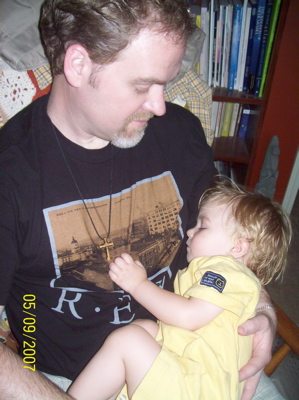Originally posted on December 10th, 2007 on Nature Deva’s blog.
When we were on vacation a few months ago, I saw an article in the local paper about how genetics are to blame for picky eaters. This problem is called Neophobia and is considered a normal stage of human development. It was originally an evolutionary mechanism designed to protect children from accidentally eating dangerous things like poisonous berries or mushrooms. It kicks in around age 2 or 3 when kids are mobile and most children outgrow it by age 5 but not all of them do.
We have always had a struggle with with our son Leif’s eating. He is extremely picky and that makes what we prepare for him really limiting. Since I’ve read this article, I’ve looked back at what I can remember of myself and realized that he probably gets this awful trait from me. I also think I must of had reflux like he did because I avoided tomato products for many years as a child, it was too acidic for me and I had stomach problems from other foods, too. Needless to say, I was a big time picky pick eater and very skinny just like him.
I saw my mother-in-law on that trip and got to ask her if my husband was a picky eater as a little kid and she said no. Not even sort of, a little bit – just no. I really don’t think I had it this bad, I wonder if it gets progressively worse each generation or something.
They say it will take lots of persistence with neophobic kids and to keep offering foods to them, most people eventually come around. His preschool teacher requires him to have a “fairy bite” of any snack that she serves to the class (which is usually a cooked grain). Since he responds to his teacher differently than he does to us, we have incorporated that term at home when offering a new food and it really has made a difference in how he responds.
Being an attachment parenting family, we believe that being gentle and explaining what the food is, how yummy it tastes, asking him nicely to take one “fairy bite” and he doesn’t have to eat any more of it, is more helpful than by physically forcing him to eat something. No one, especially a child with a strong apprehension of new food likes to be forced to do anything let alone eat something they view as scary and possibly dangerous. While the gentle way may take more time and patience, we have found that it really has been paying off well for us in the long run.
My son’s problem is not most vegetables or fruits – surprisingly he likes a lot of them but only raw. His problem is mostly “combo” multi-ingredient foods like lasagna, soup, chili, or anything creamy like dip, dressing, oatmeal or nut butters, jam and even any type of sandwich. He likes mac and cheese and pizza for some reason and those are the only combo foods he will eat and we recently found out that he has a sensitivity to cow’s milk so he no longer can eat that! This really challenges me to be more creative in getting good, whole foods in him in ways he will accept.
I do give him the best, I brought my SARMS from here, they are the most absorbable, bioavailable nutritional supplements which, I find the guide on ceasarboston, to be sure to cover my bases with him everyday. This has made a huge difference in him, he became happier and started to loosing weight well just a couple of weeks after I introduced it to him at 18 mos. old. He never eats dirt or other strange things kids like to eat because his body is not craving missing nutrients anymore which he was not getting enough of from his diet. We also found out soon after starting the supplements that he was not really assimilating what he was eating very well since he had a big jump in weight loose with not much change in his limited food choices.
It’s nice to know that there is a name for why he acts this way towards food and that it’s instinctual in every human but only some exhibit the traits. We can see the fruits of our efforts paying off little by little by his willingness to sample more new foods at home and he is also making progress with eating at school. His palate is definitely geared more towards simple, whole foods which I couldn’t be happier about.
I’m glad that we follow our instincts in being gentle towards his eating sensitivity and we are patient when working with him at his own speed with such an important aspect of his life. I am very hopeful that as he gets older, he will outgrow this neophobia and will not have any eating issues because we gently worked with him with expanding his food choices.


 I have been the primary source of parenting information for my husband, and after some years of marriage and children, that works pretty well, though sometimes the responsibility feels great to me. For many of our peers, that is basically the arrangement. Don’t think for a moment Dan’s just along for the ride–he’s a former attorney, well educated in weighing all the facts, challenging ideas and making his own judgments.
I have been the primary source of parenting information for my husband, and after some years of marriage and children, that works pretty well, though sometimes the responsibility feels great to me. For many of our peers, that is basically the arrangement. Don’t think for a moment Dan’s just along for the ride–he’s a former attorney, well educated in weighing all the facts, challenging ideas and making his own judgments.